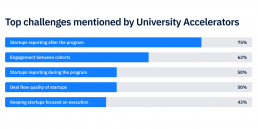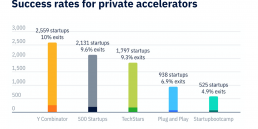Accelerator Success Metrics
0 Comments10 Minutes
The reason an accelerator exists and its business model impact the way it selects and tracks its metrics. Choosing these metrics should focus on three simple pillars: why, what and how. These pillars often trump complex management or strategy consulting frameworks, and they are a great way to ensure that all the stakeholders are aligned from the start, that the brand of the accelerator is built with consistency across all messages, and that everyone in the team works toward the same end goal.
University Accelerators
Articles,Disciplined Accelerators
0 Comments6 Minutes
Entrepreneurship has become a study subject in itself and university accelerators offer students the opportunity to practice what they are taught.
Corporate Accelerators
Articles,Disciplined Accelerators
0 Comments3 Minutes
The different mentalities that startup and corporate entities possess make them an unusual match. There are over 200 corporate accelerators looking to make a difference in the entrepreneurial ecosystem, but their efforts are most often seen as PR stunts.
Private Accelerators
0 Comments4 Minutes
We’ve seen quite a few situations of new accelerators popping up, copying the YCombinator or TechStars model and expecting that hope (or “spray and pray”, how it’s often called in the investment world) will lead to success. In most cases, within three years, most of these ventures turned into a proper seed fund, an educational program, a corporate marketing initiative, or they just died (unfortunately, there is no clear data of this—maybe we’ll look at it in a further study).
Mentoring Beyond Bragging Rights and Looking Good
0 Comments6 Minutes
Matching mentors with startups is a tedious process for various reasons. Many startups chase famous/known mentors, who have less availability, while disregarding less popular mentors who might be more willing to give time and help. Matching mentors with startups in the beginning is not a guarantee of effective mentoring throughout the program.
Education Is Essential for Incubation but Disruptive for Acceleration
0 Comments6 Minutes
Acceleration should not be an educational program ending with a Demo Day, but a process aimed at helping build successful business by offering the right support. Build your acceleration process to help you reach your end goals, considering the available resources.
Lack of Reporting Discipline Is Most Often the Accelerator’s Fault
0 Comments3 Minutes
Getting startups to report during and after the program is a challenge for most accelerators, but the discipline of reporting should be enforced and grown within the programs.
Focus May Increase Efficiency, But Doesn’t Guarantee Better Deals
0 Comments3 Minutes
Today, there is an abundance of options for startups. This makes the competition fierce, so accelerators have to find ways to appeal to top startups. Specialization is the most common strategy to tackle deal flow quantity and quality.
Deal Flow Is a Major Challenge for 2/3 of Accelerators
0 Comments4 Minutes
Two out of three accelerators have mentioned Deal Flow as their main challenge, whether it's related to quality, quantity or both. Here are a couple of findings related to this and some thoughts on how to tackle this issue.
Disciplined Accelerators: Introduction
2 Comments8 Minutes
A series of articles detailing the findings and insights from a research study carried on more than 170 accelerators.









